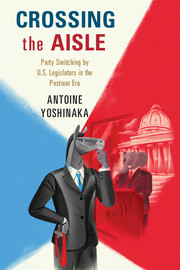47 results
Short-Term Pain for Long-Term Gain: The Logic of Legislative Party Switching in the Contemporary American South
-
- Journal:
- State Politics & Policy Quarterly / Volume 19 / Issue 2 / June 2019
- Published online by Cambridge University Press:
- 01 January 2021, pp. 259-281
- Print publication:
- June 2019
-
- Article
- Export citation
Legislative Party Switching and the Changing Nature of the Canadian Party System, 1867–2015
-
- Journal:
- Canadian Journal of Political Science/Revue canadienne de science politique / Volume 51 / Issue 3 / September 2018
- Published online by Cambridge University Press:
- 31 May 2018, pp. 665-695
-
- Article
- Export citation
Separation of Powers and Legislative Organization: The President, the Senate, and Political Parties in the Making of House Rules. By Gisela Sin. New York: Cambridge University Press, 2015. 193p. $93.00.
-
- Journal:
- Perspectives on Politics / Volume 15 / Issue 3 / September 2017
- Published online by Cambridge University Press:
- 18 August 2017, pp. 902-903
- Print publication:
- September 2017
-
- Article
- Export citation
Appendix E - Data Sources for Chapter 5
-
- Book:
- Crossing the Aisle
- Published online:
- 05 December 2015
- Print publication:
- 24 November 2015, pp 239-239
-
- Chapter
- Export citation
Index
-
- Book:
- Crossing the Aisle
- Published online:
- 05 December 2015
- Print publication:
- 24 November 2015, pp 257-265
-
- Chapter
- Export citation
Dedication
-
- Book:
- Crossing the Aisle
- Published online:
- 05 December 2015
- Print publication:
- 24 November 2015, pp v-vi
-
- Chapter
- Export citation
7 - Behind the Scenes: The Role of Party Leaders, Rank-and-File Members, and Former Party Switchers
- from PART IV
-
- Book:
- Crossing the Aisle
- Published online:
- 05 December 2015
- Print publication:
- 24 November 2015, pp 181-206
-
- Chapter
- Export citation
4 - Progressive Ambition and Party Switching: Testing the Model on State Legislators
- from PART II
-
- Book:
- Crossing the Aisle
- Published online:
- 05 December 2015
- Print publication:
- 24 November 2015, pp 84-106
-
- Chapter
- Export citation
1 - Legislative Party Switching in the United States: An Introduction
- from PART I
-
- Book:
- Crossing the Aisle
- Published online:
- 05 December 2015
- Print publication:
- 24 November 2015, pp 3-21
-
- Chapter
- Export citation
2 - Party Switching: A Theoretical Framework
- from PART I
-
- Book:
- Crossing the Aisle
- Published online:
- 05 December 2015
- Print publication:
- 24 November 2015, pp 22-50
-
- Chapter
- Export citation
List of Figures
-
- Book:
- Crossing the Aisle
- Published online:
- 05 December 2015
- Print publication:
- 24 November 2015, pp xi-xii
-
- Chapter
- Export citation
9 - Conclusion
- from PART IV
-
- Book:
- Crossing the Aisle
- Published online:
- 05 December 2015
- Print publication:
- 24 November 2015, pp 222-232
-
- Chapter
- Export citation
PART II
-
- Book:
- Crossing the Aisle
- Published online:
- 05 December 2015
- Print publication:
- 24 November 2015, pp 51-52
-
- Chapter
- Export citation
Acknowledgments
-
- Book:
- Crossing the Aisle
- Published online:
- 05 December 2015
- Print publication:
- 24 November 2015, pp xiii-xvi
-
- Chapter
- Export citation
Appendix B - Details about Elite Interviews
-
- Book:
- Crossing the Aisle
- Published online:
- 05 December 2015
- Print publication:
- 24 November 2015, pp 235-236
-
- Chapter
- Export citation
References
-
- Book:
- Crossing the Aisle
- Published online:
- 05 December 2015
- Print publication:
- 24 November 2015, pp 241-256
-
- Chapter
- Export citation
PART IV
-
- Book:
- Crossing the Aisle
- Published online:
- 05 December 2015
- Print publication:
- 24 November 2015, pp 179-180
-
- Chapter
- Export citation
List of Tables
-
- Book:
- Crossing the Aisle
- Published online:
- 05 December 2015
- Print publication:
- 24 November 2015, pp ix-x
-
- Chapter
- Export citation
Frontmatter
-
- Book:
- Crossing the Aisle
- Published online:
- 05 December 2015
- Print publication:
- 24 November 2015, pp i-iv
-
- Chapter
- Export citation

Crossing the Aisle
- Party Switching by US Legislators in the Postwar Era
-
- Published online:
- 05 December 2015
- Print publication:
- 24 November 2015



